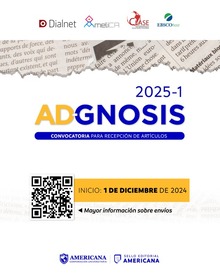Social marketing for tax collection
DOI:
https://doi.org/10.21803/adgnosis.14.15.963Keywords:
Social Marketing, Microenterprises, Tax Morale, Tax Collection, Apparel SectorAbstract
Introduction: Developing countries face a double
challenge: scarcity of resources to meet the social
demands of their citizens and precarious tax systems
resulting in insufficient tax collection. This situation
underscores the need to explore the factors that
influence citizens' willingness to contribute to
taxation. Objective: To analyze the tax morale of
microentrepreneurs in the textile sector in Lambayeque, Peru. Methodology: Applying a structured questionnaire to a representative sample of entrepreneurs in the sector, to evaluate the factors of perception and tax compliance of microentrepreneurs that affect their willingness to pay taxes, as well as the strategy implemented by the tax administration. Results: Based on the results obtained, a Social Marketing proposal was formulated to improve
tax collection and promote a tax culture among this
business group. The findings revealed that government transparency, a lower tax rate, provision of high quality services, a progressive tax system and the transparency of the tax system are the main motivators for paying taxes, decreasing coercive measures and reducing corruption. Conclusion: the central contribution of this study is the formulation of a Social Marketing proposal to improve tax collection and improve the tax culture in the context of microentrepreneurs, offering a route to strengthen the tax base in developing countries, promoting an environment of greater trust and tax compliance.
Downloads
References
Alarcón García, G. & Ayala Gaytán, E. (2013). Trust in Spanish Governments: Antecedents and Consequences. Economic Analysis and Policy, 43(2), 177-193. https://doi.org/10.1016/S0313-5926(13)50017-8
Alcívar Toala, K. J., Carbo González, M. F. & Paredes Floril, P. R. (2024). La Evasión Fiscal como Efecto a la Carencia de Cultura Tributaria en los Contribuyentes de Guayaquil. Revista Multidisciplinaria Voces de América y el Caribe 1(2), 507-549. https://remuvac.com/index.php/home/article/view/81/110
Alexander, P. & Balavac-Orlic, M. (2022). Tax morale: Framing and fairness. Economic Systems, 46(1), 1-20. https://doi.org/10.1016/j.ecosys.2021.100936
Alm, J. (2014). Does an uncertain tax system encourage ‘‘aggressive tax planning”?. Economic Analysis and Policy, 44(2014), 30–38. https://doi.org/10.1016/j.eap.2014.01.004
Alonso Vázquez, M. (2006). Marketing social corporativo, una nueva estrategia comercial en España. Eumed.net. https://www.eumed.net/libros-gratis/2006a/mav/index.htm
American Marketing Association (2017). Definitions of Marketing. https://www.ama.org/the-definition-of-marketing-what-is-marketing/
Arenas de Mesa, A. (2016). Sostenibilidad fiscal y reformas tributarias en América Latina. CEPAL. https://www.cepal.org/es/publicaciones/40624-sostenibilidad-fiscal-reformas-tributarias-america-latina
Armas, A. & Colmenares, M. (2009). Educación para el desarrollo de la Cultura Tributaria. REDHECS: Revista electrónica de Humanidades, Educación y Comunicación Social, 4(6), 123-142. https://ojs.urbe.edu/index.php/redhecs/article/view/617/639
Ashby, J. S., Webley, P. & Haslam, A. S. (2009). The role of occupational taxpaying cultures in taxpaying behaviour and attitudes. Journal of Economic Psychology, 30(2009), 216–227. https://doi.org/10.1016/j.joep.2008.08.005
Casais, B., Ferreira, M. R., & Proença, J. F. (2019). Social Marketing for the Reduction of Tax Evasion: The Case of Electronic Invoicing in Portugal. En D., Diaz-Meneses, G., Basil, M. (eds). Social Marketing in Action (pp. 41-44), Springer Texts in Business and Economics. https://doi.org/10.1007/978-3-030-13020-6_11
Castañeda Rodriguez, V. M. (2015). La moral tributaria en América Latina y la corrupción como uno de sus determinantes. Revista Mexicana de Ciencias Políticas y Sociales, 60(224), 103-132. https://doi.org/10.1016/S0185-1918(15)30005-2
Castañeda Rodriguez, V. M. (2017). La equidad del sistema tributario y su relación con la moral tributaria. Un estudio para América Latina. Investigación Económica, 76(299), 125-152. https://doi.org/10.1016/j.inveco.2017.02.002
Ciziceno, M. & Pizzuto, P. (2022). Life satisfaction and tax morale: The role of trust in government and cultural orientation. Journal of Behavioral and Experimental Economics, 97, 101824. https://doi.org/10.1016/j.socec.2021.101824
Cullis, J., Jones, P. & Savoia, A. (2012). Social norms and tax compliance: Framing the decision to pay tax. The Journal of Socio-Economics, 41(2012), 159–168. https://doi.org/10.1016/j.socec.2011.12.003
Gangl, K., Torgler, B., Kirchler, E. & Hofmann, E. (2014). Effects of supervision on tax compliance: Evidence from a field experiment in Austria. Economics Letters, 123(3), 378–382. https://doi.org/10.1016/j.econlet.2014.07.019
Goldberg, M., Fishbein, M. & Middlestadt, S. (1997). Social Marketing. Theoretical and Practical Perspectives. Routledge. Guijarro Tarradellas, E. & De Miguel Molina, M. (2014). Marketing Social. Universidad Politécnica de Valencia. https://riunet.upv.es/handle/10251/39432
Kogler, C., Batrancea, L., Nichita, A., Pantya, J., Belianin, A. & Kirchler, E. (2013). Trust and power as determinants of tax compliance: Testing the assumptions of the slippery slope framework in Austria, Hungary, Romania and Russia. Journal of Economic Psychology, 34(2013), 169-180. https://doi.org/10.1016/j.joep.2012.09.010
Kountouris, Y. & Remoundou, K. (2013). Is there a cultural component in tax morale? Evidence from immigrantsin Europe. Journal of Economic Behavior & Organization, 96(2013), 104-119. https://doi.org/10.1016/j.jebo.2013.09.010
Lee, N. & Kotler, P. (2019). Social Marketing. Behavior Change for Social Good. Sage.
Levine, D., Krehbiel, T. & Berinson, M. L. (2006). Estadística para la Administración. Pearson.
OECD (2021), Fomentando la cultura tributaria, el cumplimiento fiscal y la ciudadanía: Guía sobre educación tributaria en el mundo, segunda edición, OECD Publishing, Paris, https://doi.org/10.1787/17a3eabd-es.
Pérez Romero, L. A. & Muñóz Cubillos, D. M. (2019), Marketing Social para prevenir el delito. Advocatus, 16(32), 133-153 https://doi.org/10.18041/0124-0102/a.32.5527
Pérez Romero, L. A. (2004). Marketing social: Teoría y práctica. Editorial Pearson.
Quispe, R., Fernández, M. & Gonzales, Y. (2024). Cultura tributaria y su incidencia en la recaudación de impuestos. Sciéndo, 28(1), 91-98.
http://dx.doi.org/10.17268/sciendo.2025.012
Riofrio Caraguay, L. G., Cabrera González, V. C. & López-Lapo, J. L. (2024). Cultura tributaria y cumplimiento de obligaciones fiscales en contribuyentes de la ciudad de Loja. Revista Publicando, 11(44), 71-84. https://doi.org/10.51528/rp.vol11.id2440
Santos De Lima, A (2008). Una contribución al marketing social y a la educación fiscal en Brasil: Análisis a través de casos múltiples [Tesis doctoral, Universidad de Extremadura]. Repositorio institucional de la Universidad de Extremadura. https://repositorio.enap.gov.br/bitstream/1/3806/2/ALBERTINA%20SILVA%20SANTOS.6516975208
Sipos, A. (2015). Determining Factors of Tax-morale with Special Emphasis on the Tax Revenues of local self-governments. Procedia Economics and Finance, 30(2015), 758-767. https://doi.org/10.1016/S2212-5671(15)01325-8
Stankevicius, E. & Leonas, L. (2015). Hybrid approach model for prevention of tax evasion and fraud. Procedia - Social and Behavioral Sciences, 213(2015), 383–389. https://doi.org/10.1016/j.sbspro.2015.11.555
Velázquez Ruiz, M. A., Fernández Flores, J., Meza Guitron, J. F., Velázquez de la Torre, J. N. & Lomelí Cisneros, M. (2024). Cultivando Conciencia Fiscal. Revista Yolixtli, 3(5), 90-102. https://dgutyp.sep.gob.mx/Publicaciones/Universidades/RevYolixtli_V1N5.pdf#page=90
Villasmil-Molero, M., Maza, C. A., Barros Padilla, J. & Torres Palacio, J. C. (2024). Cultura tributaria en Colombia: Un análisis del cumplimiento de obligaciones fiscales. Revista de Ciencias Sociales, 30 (Número Especial 9), 422-436. https://produccioncientificaluz. org/index.php/rcs/article/view/42280/49126

Downloads
Published
Issue
Section
License
Copyright (c) 2025 AD-GNOSIS

This work is licensed under a Creative Commons Attribution-NonCommercial-NoDerivatives 4.0 International License.





